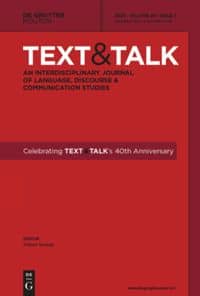Exploring Expletives: New Research Finds 27% Decline in Swearing Since the 1990s
The UK study also indicates that the gap between swear word use by men and women has lessened and that Britons have a new favourite swearword.
Press release, 20 August 2021.
The use of 16 common swear words has declined by more than a quarter in twenty years, according to a new study into how swearing has changed in casual British English conversation between the 1990s and 2010s.
The research, by Dr. Robbie Love of Aston University, UK, is published in De Gruyter’s Text & Talk: An Interdisciplinary Journal of Language, Discourse & Communication Studies.
The study draws on two large bodies of transcriptions of casual British English conversation: the Spoken British National Corpus gathered in 1994 and the same corpus from 2014. Together these include over 15 million words, so although swear words account for less than 1% of words used, the datasets of swear words are still substantial.
Dr. Love analyzed how frequently 16 common swear words were used. These covered a wide range of swearing strength, from ‘piss’ and ‘shag’ to ‘fuck’ and ‘cunt’, and included variant forms, such as ‘pissed’ and ‘pissing’. He found that the use of these words in the full corpus fell 27.6% from 1,822 words per million in 1994 to 1,320 words per million 2014, when counting both literal and figurative uses.
The ‘F-Word’ Persists
The particular swear words used also changed, with the most frequently used being ‘bloody’ in the 1990s and ‘fuck’ in the 2010s. This is due to a large decline in the use of ‘bloody’, while the use of ‘fuck’ has remained roughly steady.
Dr. Love also analyzed the demographic characteristics of the users of the 16 swear words. He found that although swearing was more common in men than in women, the difference between the genders had decreased notably, from 2.33 times more frequent in men in 1994 to 1.68 times in 2014.
Another change concerned how much people swear as they age. In both data sets, swearing is most common among people in their 20s, and declines thereafter with age. However, the decline was less steep in the 2010s, suggesting that people continue swearing later in life more than they did in the 1990s.
“Swearing occurs in all walks of life and is an everyday part of conversation for many people,” said Dr. Love. “Despite this, it is relatively under-researched precisely because it is considered to be taboo.”
“Swearing performs many social functions including conveying abuse and humor, expressing emotion, creating social bonds, and constructing identity. The strong social conditioning around swear words makes them more psychologically arousing and more memorable than other words, and something different happens in the brain when saying them compared to euphemistic equivalents, such as saying ‘fuck’ compared to ‘the f-word’. This research reinforces the view that swearing plays a part in our conversational repertoire and performs useful functions in everyday life.”
The Open Access paper can be found here
[Title Image by Etienne Girardet via Unsplash]
